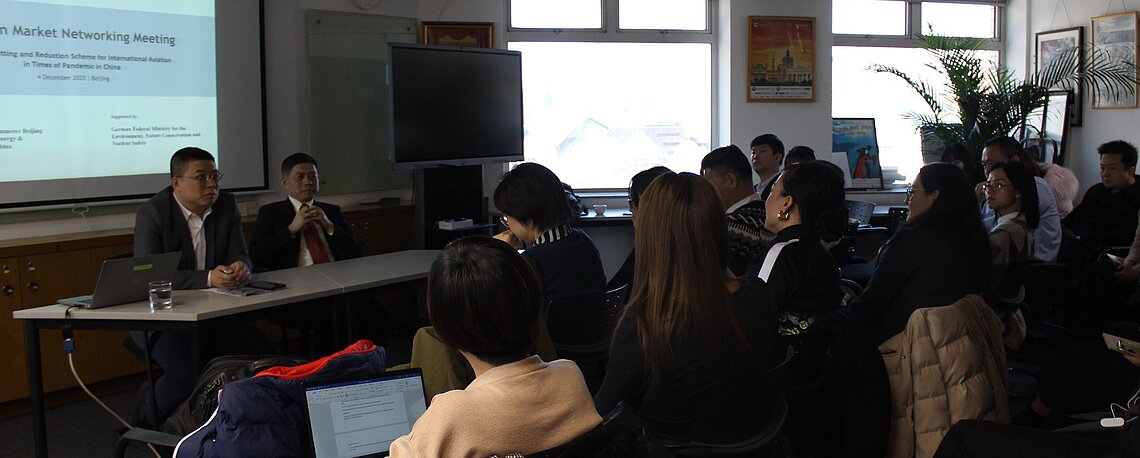May 2021 - The decline in global air traffic caused by the COVID-19 pandemic also has implications for the implementation of the Carbon Offsetting and Reduction Scheme for International Aviation, known as CORSIA. CORSIA is designed to offset GHG emissions growth from international aviation in order to stabilize emission levels from 2020.
China and other countries have signaled their intention to voluntarily participate in the pilot phase (2021-2023) and first phase (2024-2026) of CORSIA. Against this backdrop, AHK China Beijing hosted a network meeting in December 2020 with more than 30 representatives from government organizations, companies, and other stakeholders to discuss CORSIA and current developments in the aviation industry. Two experts provided insights into the status of CORSIA as well as sustainable developments and technological improvements in the aviation industry in China.
Wang Ren, Deputy Director of the Office of Energy Conservation and Emissions Reduction of the Civil Aviation Administration of China (CAAC) criticized CORSIA's goal of achieving GHGneutral growth in international aviation from 2020. This discriminates in particular developing and emerging countries with fast-growing aviation markets, he said. In addition, ICAO overstepped its authority, especially with regard to the associated standards and recommended practices, which are intended to support states in managing aviation safety risks in coordination with their service providers. Wang therefore argued for an appropriate reform pointing out that each state must observe individual national conditions, so a top-down approach by ICAO would not work.
Since achieving carbon neutrality in the long run will be much more difficult for China than for developed countries –from 2030 to 2050 China will have to reduce its emissions at an average annual rate of 8 to 10 percent – China will have to find its own ways, Wang said. In addition, the Chinese aviation sector is facing increasing demand, more competition and more mandatory environmental and emissions regulations. To meet these challenges, it will need a variety of approaches from new technologies to biofuels and electric energy substitution, building energy management systems and market-based mechanisms.
Dr. Ma Xiangshan of the Energy Foundation China then gave an outlook on sustainable developments and strategies in China's aviation industry. Despite a decrease in relative fuel and energy consumption due to increasing demand, there was no absolute reduction in emissions, merely a reduced increase. An absolute increase in fuel and energy consumption is also expected in the future, he said. Therefore, to achieve the targets for the international aviation sector, more ambition for green aviation is required in the future. In China, 98.1 percent of aviation energy consumption is accounted for by jet fuel, so development efforts are required in this sector.
Key points of China's green aviation vision include a green development concept, space savings, improving resource and energy efficiency, building green airports, curbing carbon emissions, and minimizing negative impacts on the environment. Essential in this regard, according to Dr. Ma Xiangshan, is the focus on the integrated 3-E (Economy-Energy- Environment) strategy and the construction of interrelated initiatives for a medium-to-long-term "energy and technology revolution," systematically considering the political, socioeconomic, technological and energy aspects in the airline and airport sectors.
Recommended initiatives according to Ma include focusing on market-based mechanisms in addition to formulating new policies and plans, designing, and implementing the national energy and technology revolution. These include increasing specific capital investments in selected energy conservation and fuel efficiency improvement projects and integrating aviation into the National Emissions Trading System and CORSIA.

